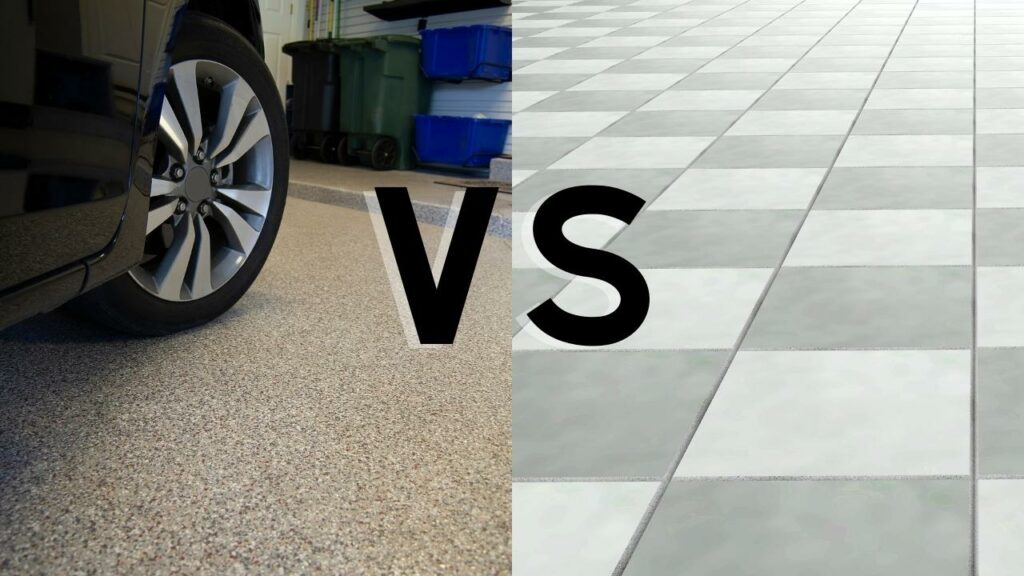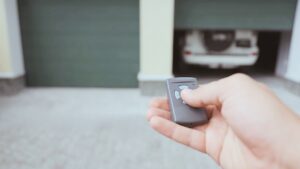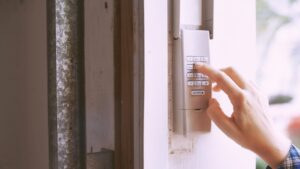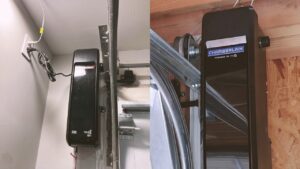When comparing garage floor tile vs epoxy flooring, the latter is considered a better option for garage floors as it offers a glossy, seamless, durable, and impervious surface finish. On the other hand, a tiled floor provides a different aesthetic appeal, plus it’s much easier to install.
Although each option is often associated with a particular aesthetic “stereotype,” tiled and epoxy flooring can be customized based on your preferences.
Still, each of these flooring systems has its pros and cons.
| CATEGORY | TILED FLOOR | EPOXY FLOOR |
| Installation | It takes 1 day to finish and Can be done by DIYers | It takes 2 days to complete; it requires special tools and equipment |
| Aesthetics | It provides more colors, shapes, and design options | Limited to solid colors and “stone finish” using flakes |
| Maintenance | Prone to stains, grout can break down due to cleaning products | A smooth and seamless finish helps in resisting stains and dirt |
| Safety | Anti-slip solutions can be used to achieve a non-slip surface | Beads can be added to achieve an anti-slip finish |
| Repairs | Each damaged tile can be easily repaired | Damaged portions are a bit more tedious to repair |
| Durability | Prone to cracking and chipping | Known to be a durable and long-lasting flooring system |
| Cost | Range: $800 to $1,800 | Range: $800 to $3000 |
If you’re still confused, here are some important things you have to consider carefully:
Installation Process
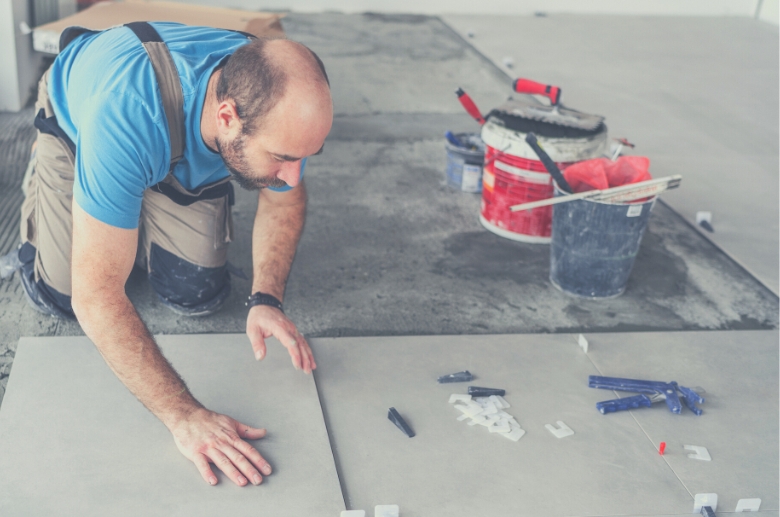
For DIYers and rushed jobs, convenience in the installation process is crucial. Fewer steps require less time and minimize errors.
Tilling installation should be relatively easy if the concrete slab has the correct elevation or level (and is without damage). Tile installation requires minimal preparation and a faster curing time, which generally takes only one day. After that, the garage can be opened to traffic.
NOTE: Spalling or dusting on slabs should be repaired first before tile installation. The substrate should be strong and sound to prevent tile debonding.
Epoxy flooring, on the other hand, requires more time to install.
The substrate must be smoothed out before applying the primer and epoxy coating. Epoxy floor coatings are also sensitive to moisture and temperature. Without proper tools and equipment, the epoxy floor can suffer from blistering, the formation of bubbles, and an uneven finish.
Generally, it takes two days to install an epoxy floor.
Pro Tip: If you don’t have the knowledge, skills, and tools to do the job yourself, hire a professional. It’s always best to avoid unnecessary mistakes to save time and money.
Connect With A Garage Expert
Connect with local experts, Compare quotes, Get the best price.
Aesthetics and Customization
Many people spend time in their garages. For some, their garage also serves as a workplace or a venue for leisure activities.
In this case, a tiled floor is an excellent option to create an appealing garage/workspace/man cave.
Tiles are versatile materials that can enhance the aesthetics of any space. The garage flooring can be easily personalized through different tile types, colors, and patterns.
In contrast, epoxy floors have relatively limited design options.
Usually, epoxy coatings come in solid, glossy colors. However, there are ways to enhance the design of solid-colored epoxy floors. Shiny and matte flakes in different colors can be added to provide a “natural stone” finish to the epoxy flooring.
PRO TIP: You can use a different color to create lines, shapes, or patterns. You can also call a professional flooring contractor that offers custom service.
Maintenance Requirements
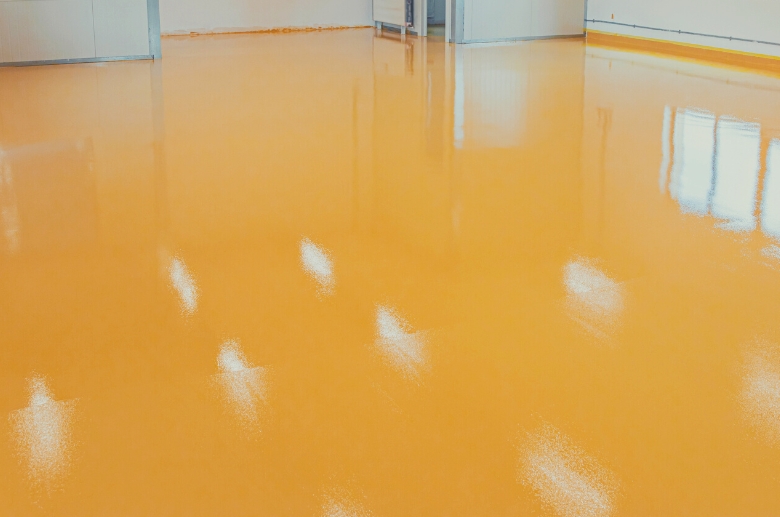
Your garage floor’s lifespan and aesthetics greatly influence how well you maintain it.
Garage floors require regular maintenance because they are subjected to various spills, including oils, drinks, acids, paints, and other chemicals.
Therefore, if the amount of time needed for maintenance is a significant factor for you, an epoxy floor is the right option.
The seamless finish of an epoxy floor is perfect for resisting dirt, stains, and chemicals. The coating’s impermeability and smoothness help in resisting liquids and dirt pickup. Cleaning an epoxy floor requires a simple sweep, mop, or wipe.
On the other hand, tiles are harder to clean. Beverages and chemicals can seep into the tile pores and leave stubborn stains and residues.
Water penetration is the biggest downside of having a tiled garage floor. For example, ceramic tiles are known to be highly porous, which makes them prone to seepage. Porcelain and granite tiles are less porous but have joints that water can penetrate.
When the grout between tiles breaks down, it’s hard to get dirt or debris out from between the tiles. Therefore, you’d have to invest in a vacuum to clean them thoroughly.
Pro Tip: You can use epoxy grout for your tiled garage floor to prevent early deterioration due to frequent cleaning. Unlike cement-based grouts, epoxy grouts are non-porous, high-strength, and chemical-resistant.
Slip Resistance and Safety
When garage spaces are utilized as a workshop, showroom, or leisure area, safety is essential. However, epoxy and tiles can be slippery because of their smooth surfaces.
Like any other high-gloss surface, epoxy flooring can become slippery when wet. However, this may not be a problem if water is not in the area.
Still, epoxy floors can become anti-slip by adding silica sand, pumice, tinted quartz, or polymer grit poured on top of them. It will, however, make the surface rough and replace the high-gloss “showroom finish” of the epoxy garage floor.
As for a tiled floor, there are many ways to improve its slip resistance. First, you can apply an anti-slip floor treatment to smooth tiles. You may also consider installing tiles with a rough profile to increase friction.
Repair or Replace
When minor damage occurs on your garage floor, it is more cost-effective to repair it rather than replace the entire flooring system.
In such a case, a tiled garage floor is easier to repair.
If there’s a cracked or chipped-off tile, it can be easily removed and replaced with a new one. Using a chisel and hammer, you can chip away the damaged tiles and tile adhesive. Then, you can install the tiles in place.
NOTE: Don’t forget to use tile spacers to ensure the new tile is aligned correctly. You can then apply the tile grout once the tile adhesive has dried.
In contrast, epoxy floors can be recoated many times without delamination issues. However, it’s relatively harder to repair portions of a damaged epoxy floor, and it also depends on the extent of the damage.
For portions that suffered from discoloration, a simple recoating will do. However, physical damages, such as cracking, peeling, chipping, or blistering, should be repaired by square-cutting the area. Note that it’s easy to commit mistakes during the repair process.
Generally, you’ll need to scrape and sand off the damaged parts, after which you can apply the new primer layer and epoxy coating.
When the epoxy floor begins to suffer from severe flaking, it must be entirely stripped away before a new coat can be applied. If you don’t, the damage will happen again and worsen the situation.
Durability and Lifespan
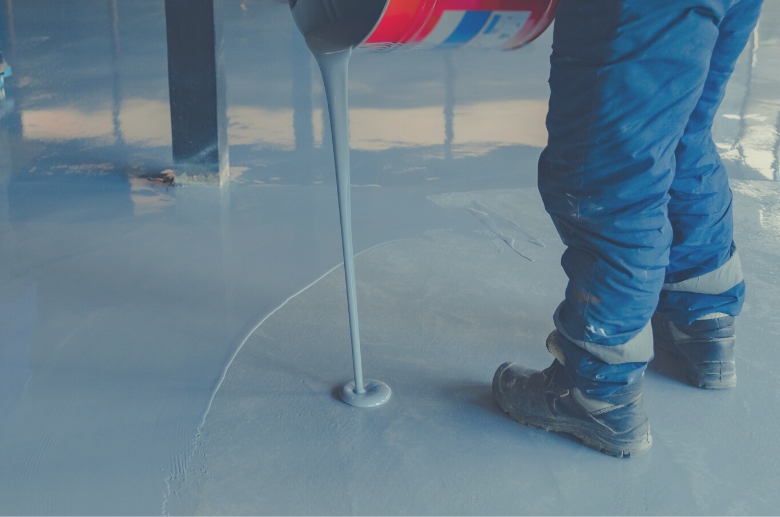
Garage floors are frequently exposed to abrasion, impact, and chemicals. Therefore, durability is a crucial consideration when selecting the right flooring system.
When installed correctly, an epoxy floor can last for decades. Due to its durability, it is also used in commercial and industrial settings.
NOTE: Always choose a 100% solid epoxy floor coating. The epoxy coating doesn’t contain water or solvents that could evaporate while curing, maintaining its original thickness or body.
On the other hand, epoxy floor coatings cannot be applied to a garage directly exposed to sunlight. Epoxy floors have poor UV resistance, and constant exposure will cause permanent damage, chalking, and breakdown due to the degradation of the epoxy.
When it comes to tiles, the biggest downside you have to consider is the cracking, chipping, and debonding.
Even when installed correctly, cracking is still a problem because tiles are not impact-resistant. So, for areas where tools and large equipment are frequently used, this is considered a huge disadvantage.
Connect With A Garage Expert
Connect with local experts, Compare quotes, Get the best price.
Cost of the System
Installing a garage flooring system entails a significant investment. So, setting your budget and expectations before the installation process is important.
The cost of an epoxy floor installation is somewhat more “stable” compared to tiling a garage.
Depending on the epoxy’s quality and any enhancements, such as patterns, beads, or flakes, the average cost of a 100% solid epoxy ranges from $45 to $150 per gallon. The labor for epoxy floor installation usually costs $3.5 to $8 per square foot. The average cost for installing an epoxy garage floor ranges from around $800 to $1,800.
In contrast, tiling costs can quickly escalate from low to high, depending on the materials, type of tile, and customizations.
The average labor cost for tile installation can range from $4 to $115 per square foot. On average, a garage tile installation project costs around $1,900 but could run from $800 to $3000. A luxury tiled floor may cost as much as $2500 or more for an average-sized garage.
Garage Floor Tile vs Epoxy Flooring: The Verdict
In summary, the epoxy garage floor reigns supreme! However, with professional installers’ help and the right materials, the tiled garage floor can still be a solid contender.
An epoxy garage floor is often considered the top option for those seeking a cost-efficient, durable, low-maintenance garage flooring solution. Therefore, epoxy floors are often used in both residential and commercial settings. In short, it’s a heavy-duty flooring system suitable for “heavy-duty” conditions.
On the other hand, a tiled floor is recommended for those who want to renovate their garage quickly. A tiled garage floor is an uncommon choice, but it’s not bad if you want an excellent flooring design in your house without breaking the bank.
We hope this guide will help you decide the best option based on your budget, needs, and preferences. Once you’ve finally thought about everything we’ve talked about so far, you can call us or request a quote so we can help you further.

